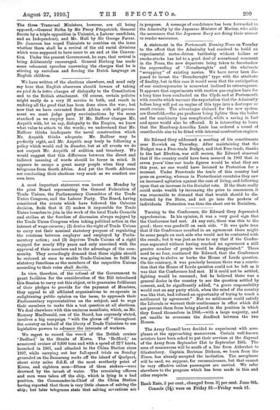Turning to the Conference, Sir Edward Grey deprecated apprehension. In
his opinion, it was a very good sign that the Conference had met. At any rate, there was, this to the good: there was goodwill on each side. "It was quite true that if the Conference resulted in an agreement there might be some people on each side who would not be contented with the result ; but it was just as true to say that if the Confer- ence separated without having reached an agreement a still greater number of people would be disappointed." There need be no fear, continued Sir Edward, that the Conference was going to shelve or burke the House of Lords question. On the contrary, it was precisely because there was a convic- tion that the House of Lords question could not be left as it was that the Conference had met. If it could not be settled, fighting would be resumed ; but he believed there was a general desire in the country to see the question settled by consent, and, he significantly added, "a grave responsibility would rest on any party which, when the mind of the country was like that, had refused an opportunity of trying to reach a settlement by agreement." But no settlement could satisfy the Liberals or warrant their continuance in office which did not prevent them from being placed in the position in which they found themselves in 1906,—with a large majority, and yet unable to overcome the deadlock between the two Houses.






































 Previous page
Previous page